Our Q1 FY22 letter to shareholders
An update to customers, stakeholders, and shareholders on our mission to unleash the potential in every team.
Fellow shareholders,
Whether it’s a team of two or an enterprise of tens of thousands, customers come to Atlassian and stay with us because we are leading the way into the future of work. In fact, we’re building that future every day through innovative products and practices that help teams collaborate like champs. Our team of nearly 7,000 Atlassians continues to put our customers first, despite the challenging circumstances we’re all facing. We have the right people, the right partners, the right purpose, and we’re on the right track.
We brought FY21 to a ripper close 🇦🇺 and kept the momentum high in Q1 of FY22. Revenue from our Cloud products was up more than 50% year-over-year, driving overall revenue growth of 34% year-over-year. Migrations continue on pace, and we welcomed 11,746 net new customers, with over 99% landing in the cloud.
We also took a moment to re-evaluate the way we define a “customer” and the way we break down revenue in our reported results. The updated customer definition and supplemental revenue reporting provide a more team-centric view and align our stakeholders with how we evaluate our business. 📈 More details below.
Good, good, goooooood, good migrations 🎶⛅️
A year after announcing the end of sales for our Server products, migration momentum continues to build steadily. Revenue from our Cloud products grew 53% year-over-year with the help of strong Premium edition adoption and the steady drumbeat of continual improvements to our Cloud platform.
All that said, migrating our Server customers is a multi-year journey, with much of it still ahead of us. To help smooth the way, we consolidated all our migration content in our updated Atlassian Migration Center this quarter. This hub serves as customers’ one-stop shop, providing clear steps for progressing through each phase. Our original Migration Center generated thousands of Cloud migration trials in FY21, and we’re excited to watch the updated version build on that success.
Speaking of building on successes, we continue to improve on our world-class Cloud platform. We’ve always prioritized the rights and privacy of customers (one of our values is “don’t #@!% the customer,” after all), and this quarter we took it to the next level when Atlassian signed on to the Trusted Cloud Principles initiative. As one of the initial signatories, we’re joining tech leaders such as Amazon, Google, and Microsoft who are committed to working with governments to ensure digital connectivity among nations, protect privacy and data security in the cloud, and promote public safety.

In parallel with this commitment, we’ve added the ability for customers to house their Atlassian data in Australia. This new data residency option removes a massive blocker for many of our Australian customers – particularly in regulated industries – as they look to move to the cloud. Australia’s largest bank, Commonwealth Bank, for instance, is taking a cloud-first approach with its digital transformation to provide the best digital experience for their customers. They have now signed on to migrate their 20,000 Jira Software and 25,000 Confluence users from Data Center to Cloud. 🥳 We’re proud to offer data residency in four locations on three continents and will continue to expand on this in the coming quarters.
Of course, one of our Cloud platform’s biggest benefits across the board is the ability to automate tedious, routine tasks and similar capabilities that play a critical role in companies’ digital transformation strategies. 🤖 Like data analytics, smarts, and extensibility, automation is a pillar of our Cloud platform. In fact, Automation for Jira is a key driver of upgrades from Standard edition, which gives customers a limited allotment of automation rules, to Premium edition, where they can run unlimited automation rules across multiple projects. As design platform Canva shared recently, Automation for Jira is saving their internal infrastructure team alone 150+ hours a month. We already see customers creating more space for their teams to innovate by running tens of millions of automation rules each month, and we’ve got plans to make this feature of our platform even more powerful and easy to use.
Three addressable markets, one extended team
Teamwork is in Atlassian’s DNA. In addition to some innovative new features built by our own teams, we want to take a moment this quarter to highlight how we’re teaming up with other companies across our three addressable markets to multiply the value we deliver for customers.
Agile development
Atlassian believes in the value of “open”- free-flowing information and open collaboration. And when it comes to software development, we believe open, flexible toolchains beat rigid all-in-one solutions. Thanks to our partnerships with other pioneers like Snyk, Launch Darkly, Datadog, and others, Atlassian is empowering customers to build the toolchain of their dreams through a solution we’re calling Open DevOps. And we’ve got some serious skin in the game.
When Snyk approached us for an investment, as part of their Series F financing, we saw an exciting opportunity to support a partner who’s been focused on our ecosystem. Snyk integrates with Jira Software and Bitbucket, infusing developers’ workflows with a security-first mindset and protecting their code against issues like open source vulnerabilities that may arise during the development process.

Integrations are key for our customers’ ability to balance agility with stability. By building a custom toolchain of best-of-breed products, with Atlassian at the center, engineering departments can streamline their workflows as well as improve traceability to make audits and post-incident analyses easier.

We try to integrate all of our teams and services, and Atlassian helps us in the process of bringing it all together.
– Damir Prusac, VP of Engineering at infobip
Customers who take advantage of Open DevOps integrations are more likely to upgrade to our Premium cloud editions, less likely to churn, and tend to grow their usage of Atlassian products faster. In a recent survey, 89% of Jira Software customers have either embraced DevOps already or plan to adopt this model in the next 12-24 months. We see a long runway for Atlassian here – watch this space. 🔮
IT service management (ITSM)
We’ve known from the beginning that Jira Service Management is a breakthrough product that brings development, IT, and business teams together like nothing that came before it. This quarter, Gartner® recognized Atlassian as a Visionary in their Magic Quadrant™ for IT Service Management Tools1. Also, customers recognized Atlassian as a Customers’ Choice in the March 2021 Gartner Peer Insights “Voice of the Customer”: IT Service Management Tools. – all within Jira Service Management’s first 12 months.
When Jira Service Management launched, over 25,000 customers were upgraded from Jira Service Desk. Now, just a year out from launch, Jira Service Management is already powering cross-functional collaboration for teams at over 35,000 customers. We recently rolled out integrations with Slack and Microsoft Teams that let users create and manage tickets without leaving their chat apps. Powered by Halp, the integration makes it easier than ever for IT service teams to collaborate across the business and with each other.

Jira Service Management is seamless. We connect IT and development tickets, so incidents can easily be transferred to a development ticket with all the details. It has improved the collaboration, working relationship, and our product.
– Jennifer Michael, Service Delivery Projects Team Lead at QAD
Work management for all
As companies reimagine how to get work done, they’re calling a lot of old habits into question. Chief among them? Synchronous collaboration – otherwise known as “meetings.” With many teams increasingly in distributed or hybrid mode, there’s mounting interest in asynchronous collaboration. That’s where Atlassian’s work management products shine, and we have multiple offerings to suit teams’ diverse needs.
This quarter we introduced a new lower-priced Trello Standard plan that is geared for growing teams that are juggling multiple projects. It comes with unlimited boards, powerful project management features, and increased automation capabilities to save time and boost team productivity.
Trello has always been popular with smaller teams because of its flexibility, simplicity, and lighthearted vibe. Now, enterprise-scale companies like global technology consultancy Thoughtworks are joining the party. “When we started looking for a project management tool, we realized that a majority of teams were using Trello for other projects,” says Andy Yates, Head of Strategy within TechOps. “There was a groundswell of opinion that Trello was the right fit, so we used that as a signal to formalize the use of the tool.” Thoughtworks has rolled out Trello to over 10,000 employees to help them coordinate their work.
Trello is chockablock with integrations called Power-Ups – over 200 and counting. With unlimited use of Power-Ups now available in every edition from Free to Enterprise, teams of all sizes can create reports, add custom fields, or connect their Trello boards to tools like Slack, Dropbox, Jira, and Confluence. Users can also automate repetitive tasks like moving or copying cards, turning Trello into a command center that connects all their teams’ tools and tasks in one shared workflow.
For capturing knowledge and sharing ideas, customers choose Confluence. With Confluence, organizations can discuss work in writing rather than in meetings. This affords the freedom to share ideas and feedback 24 hours a day, making it easy for team members to contribute no matter what time zone they’re in. 🌏 Used at over 75,000 organizations, Confluence is quietly making work more flexible, more inclusive, and more “meetless” for customers every day.
We continued to improve Confluence this quarter with improved knowledge base integration with Jira Service Management, and asynchronous creator tools like page cover images, Unsplash integration, and emojis in page titles.
Our newest offering in this massive market is Jira Work Management, which provides all the workflow, planning, and reporting capabilities of Jira, tailored for non-technical teams. And when it comes to keeping teams of teams working in concert, we now offer Team Central, which eliminates mind-numbing status reports by automatically pulling updates into a personalized feed that people actually read, and reduces friction around getting help with its user directory and help center.
Both Team Central and Jira Work Management originated in Point A, our program for fueling in-house innovation at Atlassian. Stay tuned, because there’s a lot more to come from Point A. 🔭
Laying a foundation for the long term 🏗
As we build a lasting company, we’re mindful of the fact that no company can thrive on a dying planet or in a broken society. We also understand that culture, values, and the people who embody them are just as important as strategy and execution. Here’s what’s happening behind the scenes.
Doing our part
The risks posed by climate change and structural inequalities are risks to Atlassian’s business, to say nothing of our customers’, employees’, and community stakeholders’ well-being. Earlier this month, we released our third annual Sustainability Report detailing our progress in four focus areas. We’re making great progress when it comes to reducing emissions, protecting customer privacy, and our philanthropic programs run by the Atlassian Foundation.
But in the spirit of our “open company, no bullshit” value, we’ve fallen short of our goals around diversity, equity, and inclusion (DEI), so we’re increasing our investment in DEI throughout FY22. All the details are in our 2021 Sustainability Report.
“This one’s going straight to the pool room.” 🏆
When we started Atlassian almost 20 years ago, we aimed to create a company where people love to work. So we’re thrilled to be recognized among the top 25 in the World’s Best Workplaces 2021 list, compiled by Great Place to Work.
This is a credit to the true stewards of our culture: the thousands of Atlassians around the world who live our values every day. In a world where capital is easy to access and strategy is easy to emulate, culture becomes a significant competitive advantage. The Atlassian team’s dedication to supporting our customers and each other will keep us grounded as we continue to grow.
Personnel updates
Last, we have some exciting updates to share about our team. Cloudflare Co-Founder, President, and COO Michelle Zatlyn joined our Board of Directors in September. Her track record as a mission-driven disruptor and core ethos of building a better Internet will bring a unique perspective to our Board. Welcome, Michelle! 👋🏽
We also promoted Anu Bharadwaj to Chief Operating Officer and Joff Redfern to Chief Product Officer this quarter. Congratulations to both. 🎉 Prior to this, Anu was Head of Enterprise and Cloud Platform and Joff was Vice President of Product. Anu and Joff have made a tremendous impact on Atlassian’s portfolio and journey to become a cloud-first company. We’re thrilled to see them grow within Atlassian and continue to take on more, and can’t wait to see them crush it in their new roles.
CFO transition
After a long and successful career, our CFO James Beer has decided to retire, which will see him transition CFO responsibilities to a to-be-determined successor at the end of FY22. We have commenced an external search and look forward to providing updates.
James joined Atlassian as CFO in February 2018 and has played an invaluable role in helping the company scale. James is an esteemed leader and one of his many accomplishments has been building a very strong finance team, which will continue to have a critical role in the growth of the company.
When James joined, Atlassian had just 2,500 employees, 119,000 customers, and would generate revenue of $881 million in fiscal 2018. As of the end of this quarter, we have nearly 7,000 employees, over 216,000 customers, and are on pace for an annualized revenue run rate of $2.5 billion. While we’re disappointed to see James leave us, both of us are grateful for James’ leadership and friendship over the years.
We’re proud to close out another successful quarter and look forward to discussing it further with you on our earnings call. Here’s to the road ahead, and to unleashing the potential of every team.
– Mike and Scott
the bottom line
- Migrations are on track and Cloud revenue for the quarter was $318 million,
up 53% year-over-year. - Atlassian is well positioned in each of our three addressable markets: agile development, IT service management, and general work management. A robust ecosystem of integrations is further strengthening our position.
- Being an early signatory of the Trusted Cloud Principles initiative, and progress against our climate goals, demonstrate our commitment to corporate social responsibility and sustainability.
Customer highlights
Atlassian’s flywheel keeps on spinning across our three core markets, landing 11,746 net new customers this quarter, for a total count of 216,500. Meanwhile, our Solutions Partners and customer-facing teams continue their work with existing customers, driving migrations, expansion, and upgrades to our Premium editions.
In our conversations with CIOs and other decision-makers, digital transformation and distributed teamwork remain common themes. More companies are leaning into remote and hybrid work arrangements, which means they’re not only transforming how they serve customers, but also transforming the employee experience. These customers have no shortage of options in each of our core markets. But they’re choosing Atlassian because of the unparalleled value we deliver.
We revised our definition of a customer this quarter to capture unique domains that have at least one active, paid product license or subscription with two or more seats. The primary difference is that we are now excluding single-user Trello accounts from our official customer count. In past quarters, we’ve called out those single-user accounts in the name of transparency. But we feel that going a step further and updating our customer definition will better align investors and stakeholders with how we measure our business.
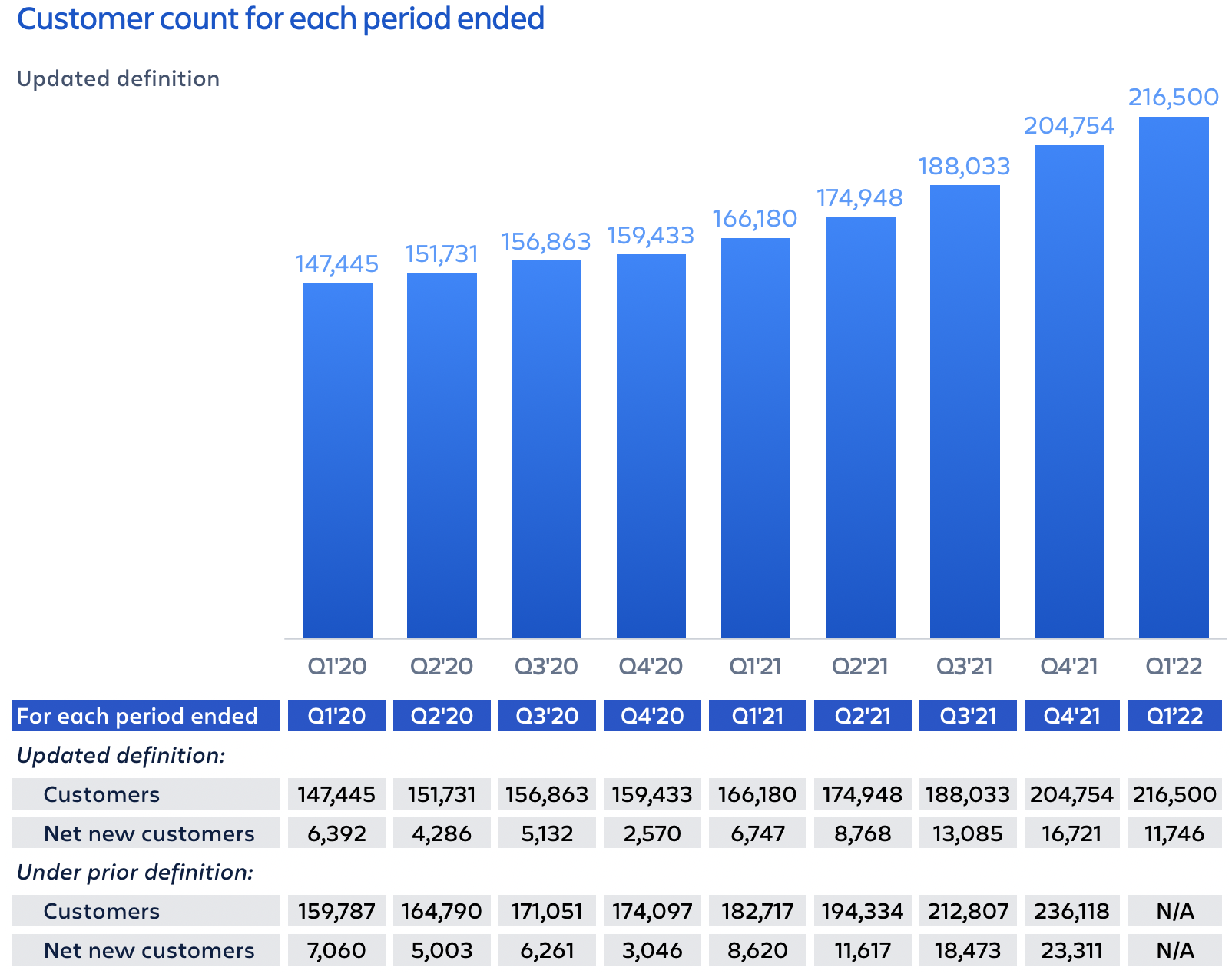
We love that individuals take advantage of our products. These users often bring tools like Trello into their workplace and become evangelists for Atlassian within their company! There are also millions of people using Free editions of our Cloud products and Starter licenses that we do not count in our official customer count, but act as accelerants for our business. Ultimately, our focus is on team collaboration. That’s how we measure progress toward our goals.
Regardless of their size, we’re blown away by the impact our customers have on the world –from putting news and entertainment at our fingertips to addressing inequalities in health care to making sure the trains run on time. We come to work each day with a single purpose: to support these teams with tools that help them work more efficiently and effectively. And we’ll maintain that focus as we grow to serve the “Fortune 500,000” and beyond.
Get a front-row seat to the future of ITSM 🎟
Atlassian’s “High Velocity: ITSM World Tour,” a 2-hour digital broadcast, kicks off on November 10th at 8:00 a.m. Pacific Time.
The program will feature members of Atlassian’s leadership team along with internationally renowned vocal artist, beatboxer, musician, and comedian, Reggie Watts, from The Late Late Show with James Corden. During the event, you’ll get access to:
- An in-depth look at the latest advancements in Jira Service Management.
- Customers “unplugged,” where companies like Lufthansa Technik, Saint Gobain, Ginkgo Bioworks, and Belong (a Telstra subsidiary) share how they scaled their service management practices.
- Expert tips and a live Q&A with our product leaders.
Don’t miss this chance to learn first-hand how customers are taking advantage of Jira Service Management and other Atlassian products to deliver world-class IT service. Register here, free of charge. See you there!
– Cameron
the bottom line
- We’ve revised our customer definition to be unique domains that have at least one active, paid product license or subscription with two or more seats.
- Our “High Velocity: ITSM World Tour” event is a great chance to hear more about how Atlassian is shaping the future of ITSM.
Financial highlights
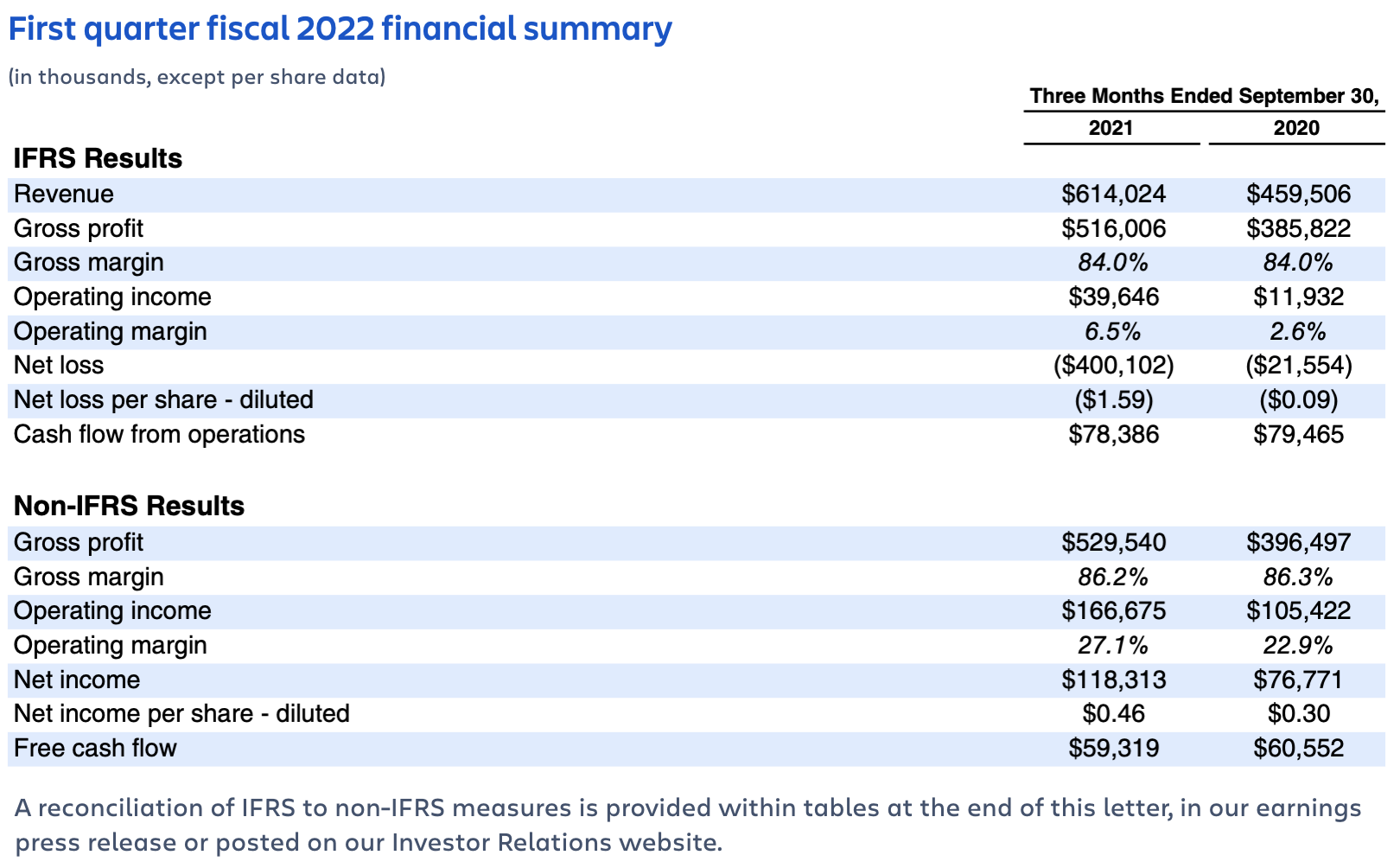
First quarter fiscal 2022
Our momentum carried forward from FY21 and we realized strong financial performance in Q1’22. We continue to see strong customer demand across our cloud products, are tracking well against our Cloud migration expectations, and most importantly, we continue to make steady progress towards our long-term goals.
Highlights for Q1’22 include:
- Subscription revenue grew 57% year-over-year. Specifically, Cloud revenue grew 53% year-over-year while Data Center revenue grew 68% year-over-year. We are pleased with these growth rates as we focus on driving subscription revenue growth.
- We continue to execute well against our ambitious hiring plans. In Q1’22, we added 479 net new Atlassians – our biggest quarter ever. We will leverage our unique culture and “TEAM Anywhere,” as we continue adding top-tier talent around the globe. Our strong financial position provides us with the flexibility to invest in talent to help to accelerate our cloud-first goals and create value for our customers across our three core markets.
Other updates
After 18 years as a public company CFO in three different industries and having celebrated my 60th birthday earlier this year, it is the right time for me to retire and pass the baton to the next leader. Atlassian has terrific momentum, including the contributions of a very strong financial team, and is exceptionally well positioned to continue executing on its mission. I’m excited about what’s happening across the company and the raft of opportunities ahead. I’m focused on creating a smooth and seamless transition to my successor and am looking forward to continuing to help drive the future of teamwork over the next few quarters.
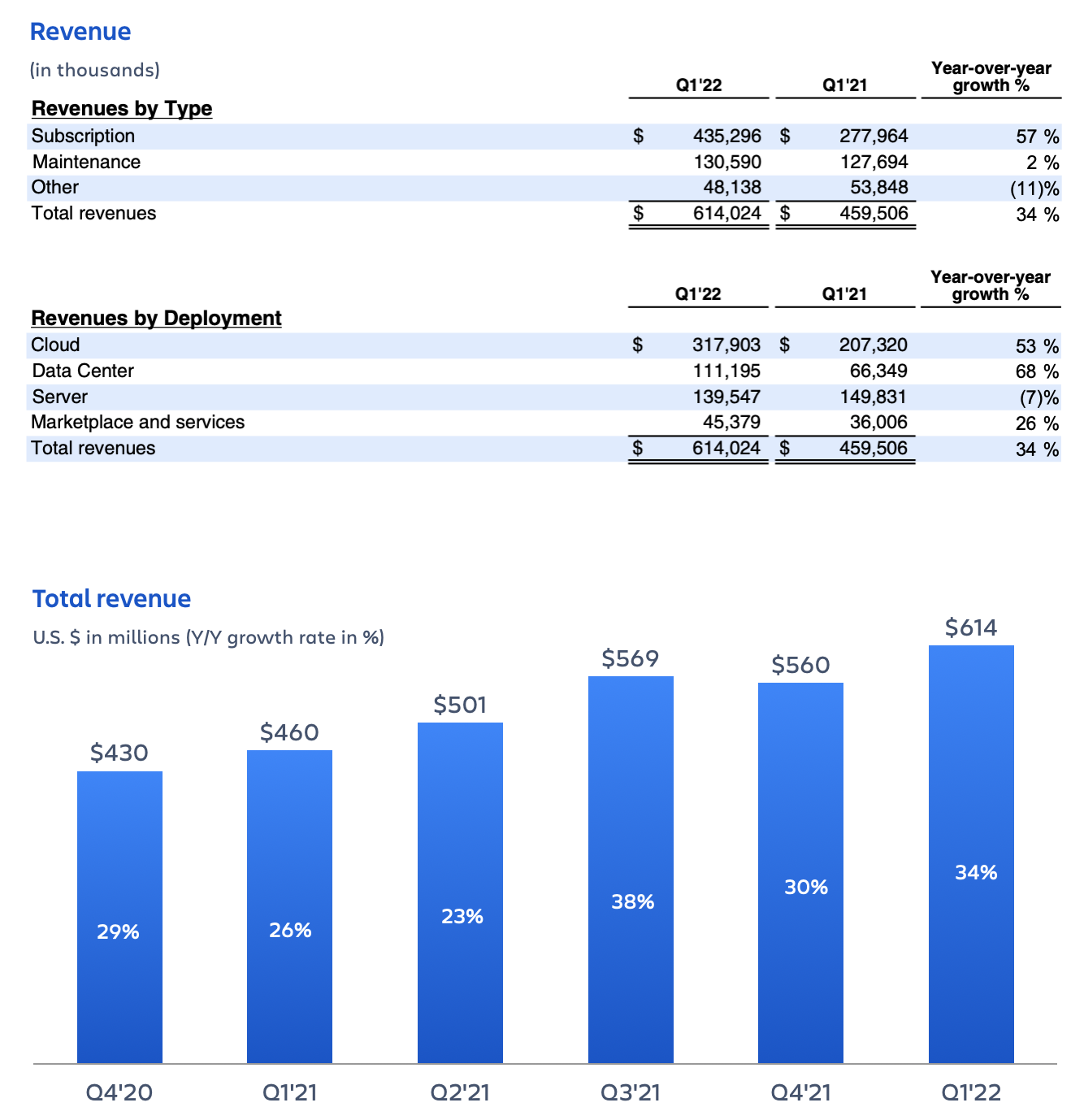
As discussed above, we feel it is important to align our stakeholders with how we measure our business. Given our ongoing transformation into a cloud-first company, we are sharing a quarterly revenue by deployment disclosure as a supplement to our financial statements to highlight the scale and growth rates of our Cloud and Data Center businesses. Historical data by quarter, beginning with Q1’20 through Q4’21, can be found in the below table and on our IR website. We will continue to share this supplemental revenue by deployment disclosure going forward.
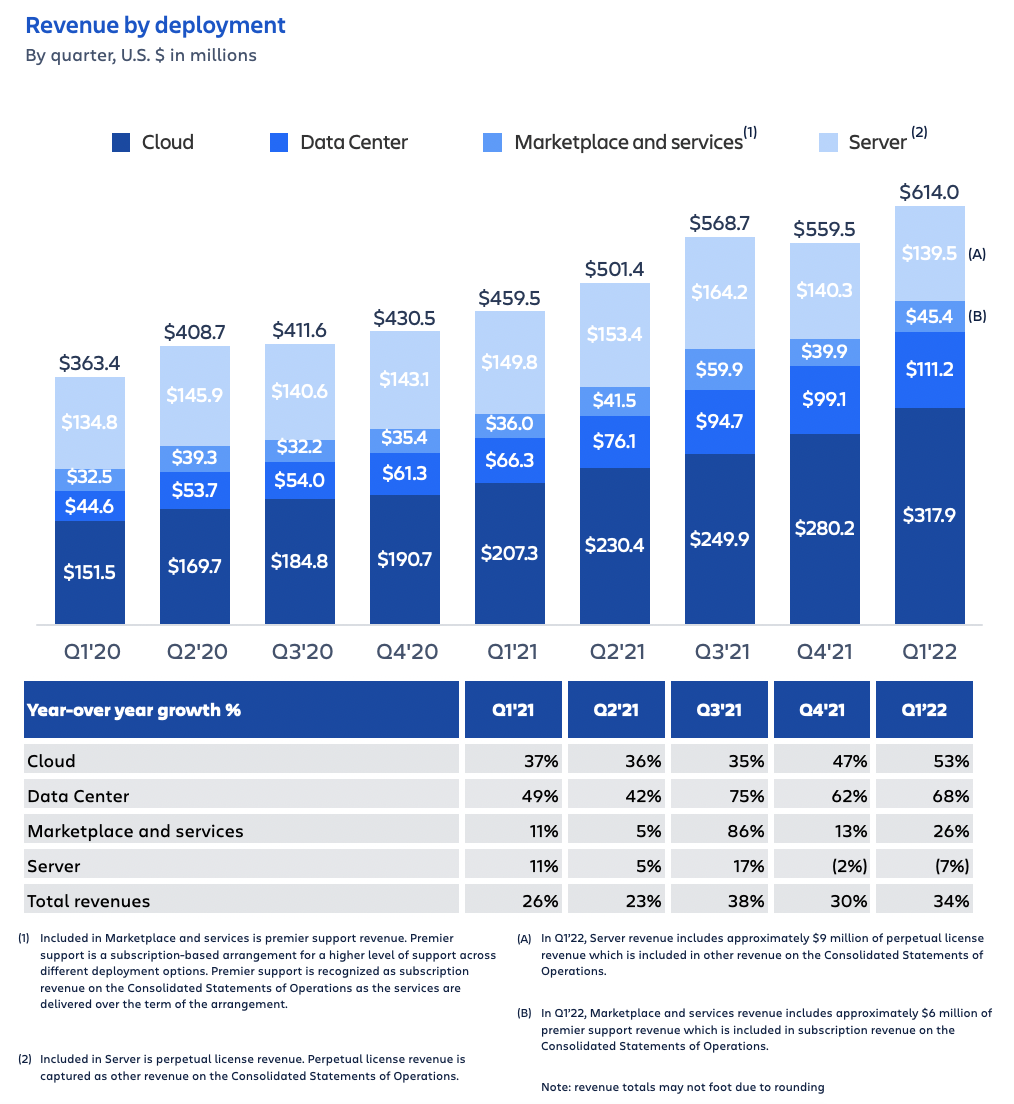
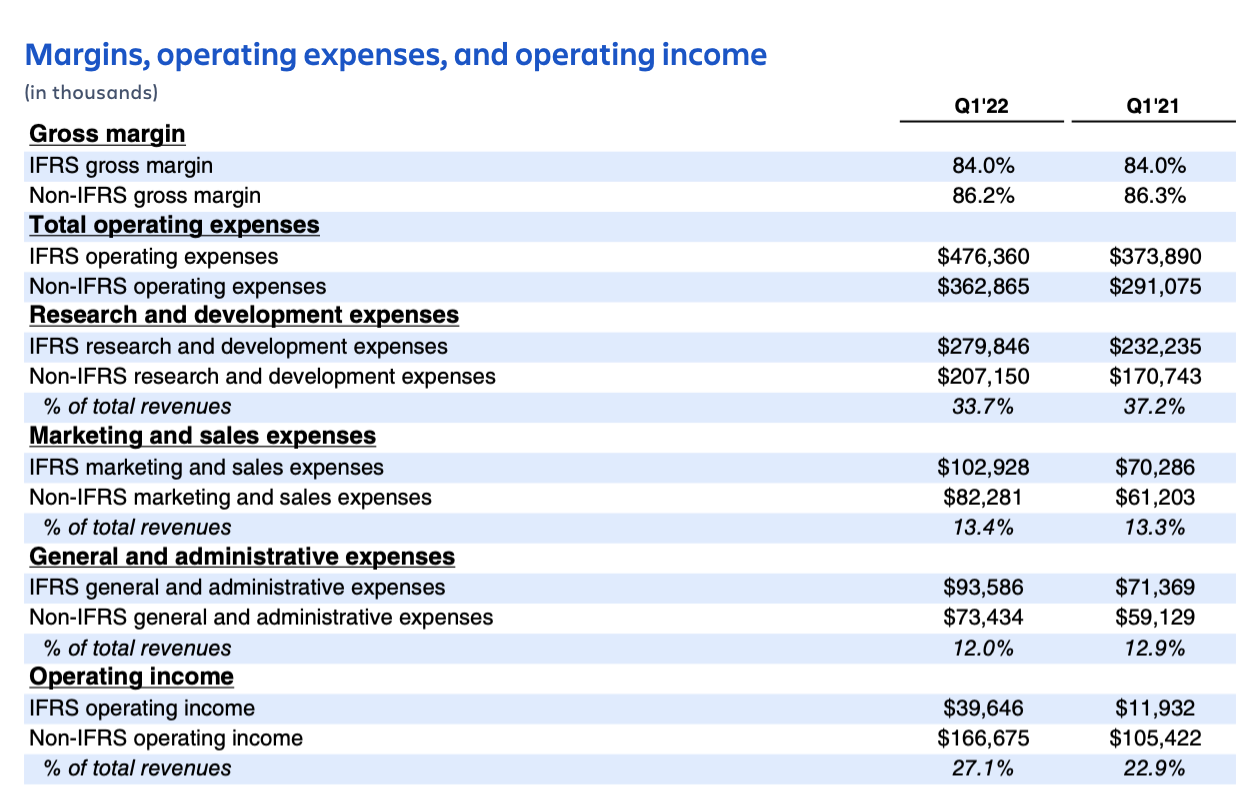
Headcount
Total employee headcount was 6,912, an increase of 479 employees since the end of Q4’21. We hired across all major functions, with the largest number being added in R&D.
Net income

Net loss for Q1’22 included a charge of $424.5 million recorded in “other non-operating expense, net,” compared with a charge of $27.5 million in Q1’21 relating to our exchangeable senior notes and related capped calls. Of this amount, a loss of $370.4 million is related to marking to fair value the exchange feature of the notes and related capped calls that remain outstanding as of quarter-end. In addition, a net loss of $54.1 million is related to the net impact of settling the early exchange requests of the notes and unwinding of the related capped calls during this quarter.
Balance sheet
Atlassian finished Q1’21 with $1.6 billion in cash and cash equivalents and short-term investments.
During Q1’22, we drew $650.0 million from our term loan facility, used $314.3 million in cash to settle the early exchange requests of the notes, and received $31.0 million in cash from the unwinding of the related capped calls. The net impact resulted in cash inflows of $366.7 million, which is reflected in cash provided by financing activities on our consolidated statements of cash flows.
Free cash flow

Financial targets
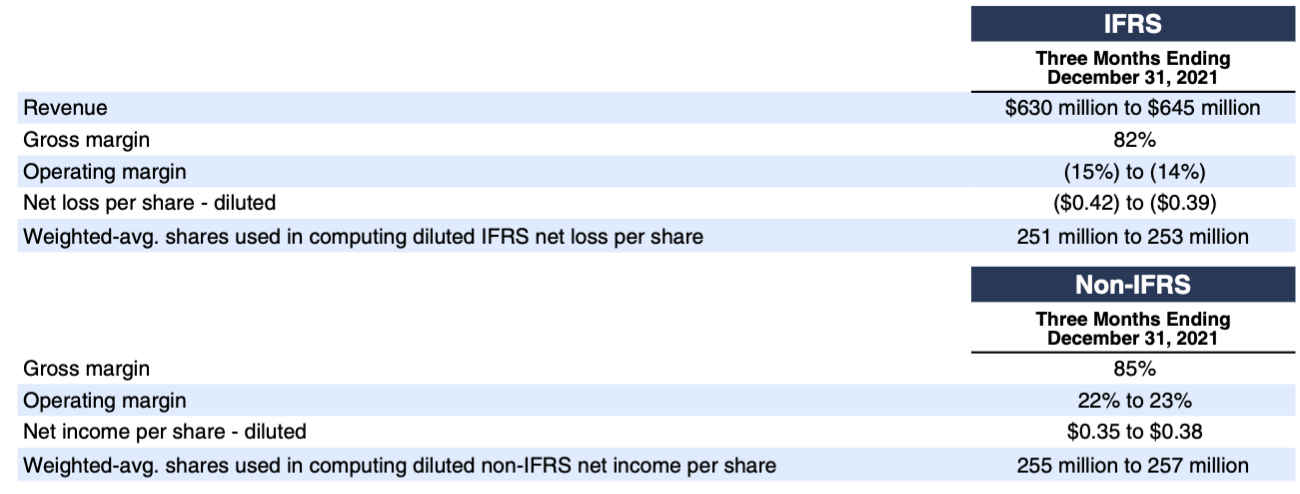
Fiscal 2022 outlook
Revenue
While our Cloud migration progress is tracking to plan, we continue to believe we have a multi-year migration journey ahead of us. As a result, we continue to expect variability in our revenue growth as customers choose the timing of when to migrate to our Cloud or Data Center offerings. We believe this variability will be transitory as we work through our cloud-first transformation. As a reminder, while we discontinued sales of new Server licenses in Q3’21, upgrades of existing Server licenses will continue to be available to Server customers through Q3’22. We will continue to offer maintenance and support to Server customers until February 2024.
In FY22, we expect to see the following trends:
Subscription revenue
- We expect subscription revenue growth year-over-year to be in the mid-40s % range for FY22. While it is still early in the year, we are updating our target from the low to mid-40s % target we issued last quarter. Subscription revenue will continue to be the primary driver of revenue growth.
- We expect our subscription revenue growth rate to be higher in the first half of FY22 relative to the second half.
- Recall, our subscription revenue in Q3’21 benefited from a strong Data Center revenue growth rate, driven by accelerated demand resulting from the discontinuation of new Server license sales and customers purchasing ahead of both Server and Data Center price increases that went into effect during Q3’21.
- For Data Center revenue, a portion is recognized up-front as subscription revenue in the period that the contract is signed, while the remainder is recognized ratably over the life of the contract.
- In addition, it is important to note Q4’21 continued to see strong Data Center revenue growth, as it benefited from ratable revenue rolling off of our deferred revenue balance. Our deferred revenue balance benefited from the event-driven purchasing observed in Q3’21, as noted above.
- For FY22, we expect our Cloud revenue growth rate to accelerate relative to FY21.
Maintenance revenue
- While we expect our Server business to be the primary driver of the variability in this coming year’s results, we are assuming maintenance revenue slowly contracts over the course of FY22. In Q4’22, we expect maintenance revenue to decline to approximately $100 million.
Other revenue
- With the expected contraction of the Server business, combined with the discontinuation of sales of new Server licenses in Q3’21, perpetual license revenue is expected to be a relatively nominal amount in FY22. As such, we are including perpetual license revenue in other revenue on the Consolidated Statements of Operations. As a reminder, upgrades of existing Server licenses will continue to be available to Server customers through Q3’22. We expect quarterly perpetual license revenue to be flat at approximately $10 million each quarter through the end of Q3’22. Upgrades of existing licenses will no longer be offered after Q3’22, and as a result, we do not expect any further perpetual license revenue beginning in Q4’22.
- We expect Marketplace revenue, which is also reflected in other revenue and the primary driver of this line item, to be approximately flat relative to FY21.
- Recall, Marketplace revenue will be impacted by the lowered Marketplace take rates on the sales of third-party Cloud apps which are designed to incentivize further Cloud app development.
- Marketplace revenue will also continue to see a headwind from the accelerated, event-driven app purchasing in Q3’21 across Server and Data Center. Note that revenue on the sale of third-party Marketplace apps is recognized in the period the product is purchased.
Tough compare in Q3
We observed unprecedented customer purchasing in Q3’21 driven by the convergence of events from the end of new Server license sales and price changes to our on-premises products. As a result, Q3’22 will be a tough compare from a year-over-year revenue growth perspective.
Profitability
We continue to make progress with our ambitious hiring plans, advancing our platform, bolstering our existing Cloud products with new functionality, and innovating through new product initiatives. But we have more work to do. There are many opportunities we want to seize across agile development, ITSM, and work management for all.
We will continue to invest purposefully to drive long-term durable growth. We will continue to hire talent from across the globe with the significant majority in R&D. Our ambitions reflect our long-term view. Our willingness to invest for durable growth across each of our core markets will cause our operating and free cash flow margins to decline in FY22 relative to FY21.
We expect the following dynamics to impact our margins in FY22:
- Gross margin will decrease in FY22, due to the business mix shift from Server to Cloud. This impact will be primarily driven by increased hosting costs for Cloud Enterprise customers, as well as additional personnel costs to support migrations and our Cloud customer base. We expect gross margins to be lower in the second half than in first half.
- Operating margin is expected to decline as Server revenues contract and we continue to invest heavily in Cloud R&D. We will continue investing in our Cloud platform, supporting microservices, developing new products, improving migration tools, and driving product improvements. We expect operating margins to be lower in the second half than in the first half.
- Free cash flow is expected to be impacted as a result of the continued business mix shift to the cloud. Maintenance contracts for our Server products are only offered on annual terms, while we offer subscriptions for our Cloud products on both annual and monthly terms. In the short term, the shift to the cloud and the potential mix change in billing term may create a headwind for free cash flow. Over the long term, as more enterprise customers migrate to the cloud, we expect any such headwind to subside. The reduction in operating margin in FY22, noted above, and the unprecedented customer purchasing activity in Q3’21, will also both impact our free cash flow margin in FY22.
Share count
In FY22, we expect to see a material increase in our share-based compensation (SBC) expense as we continue to play offense and invest in our team. Recall that we report our financial statements in accordance with IFRS. SBC is recognized on a more front-loaded schedule compared to U.S. GAAP. We are targeting approximately 2% share count dilution for FY22. Despite the near-term increase in SBC expense, our comparable share dilution will still be ranked in the lower half of our peer company set.
We’re excited about the progress we continue to make and taking the next step forward in our mission of unleashing the potential of every team.
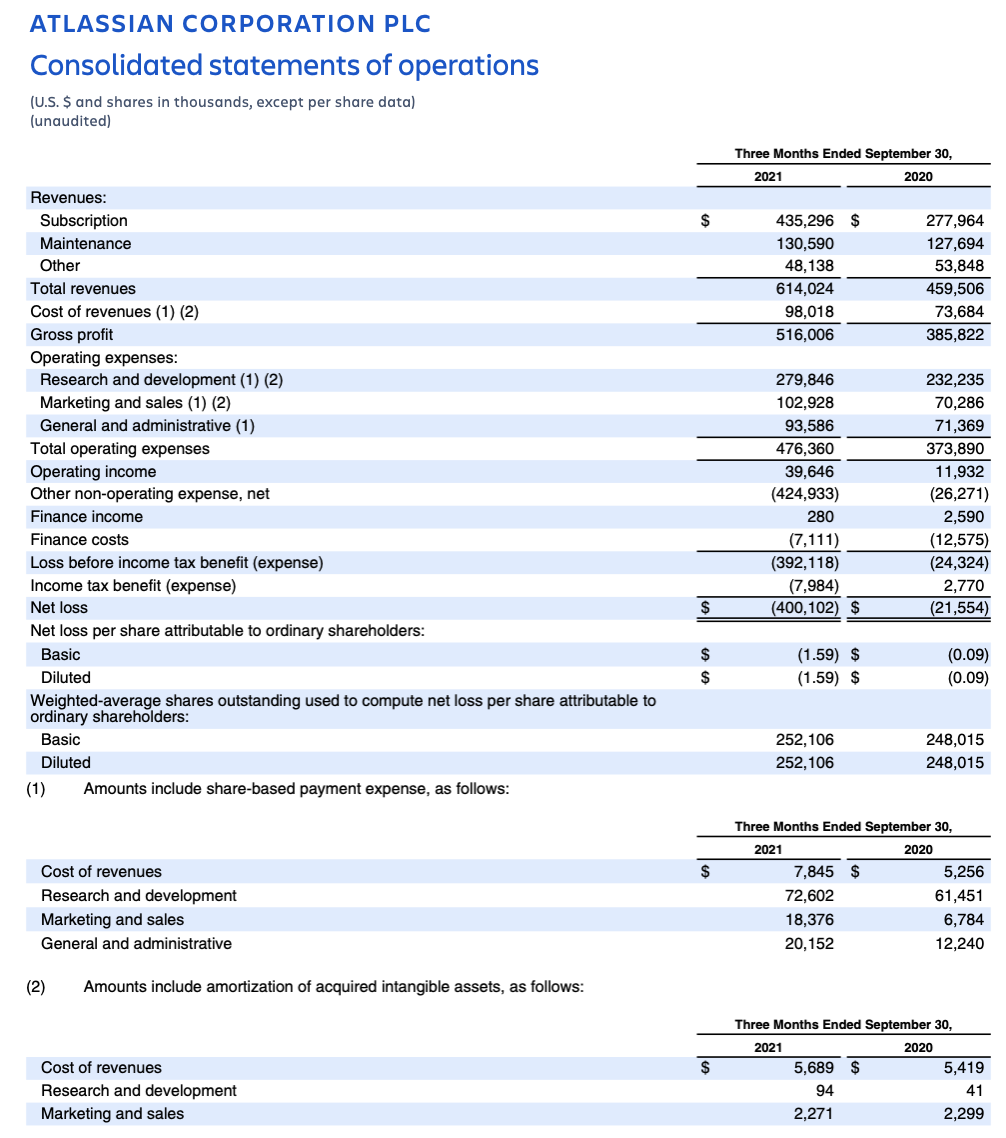
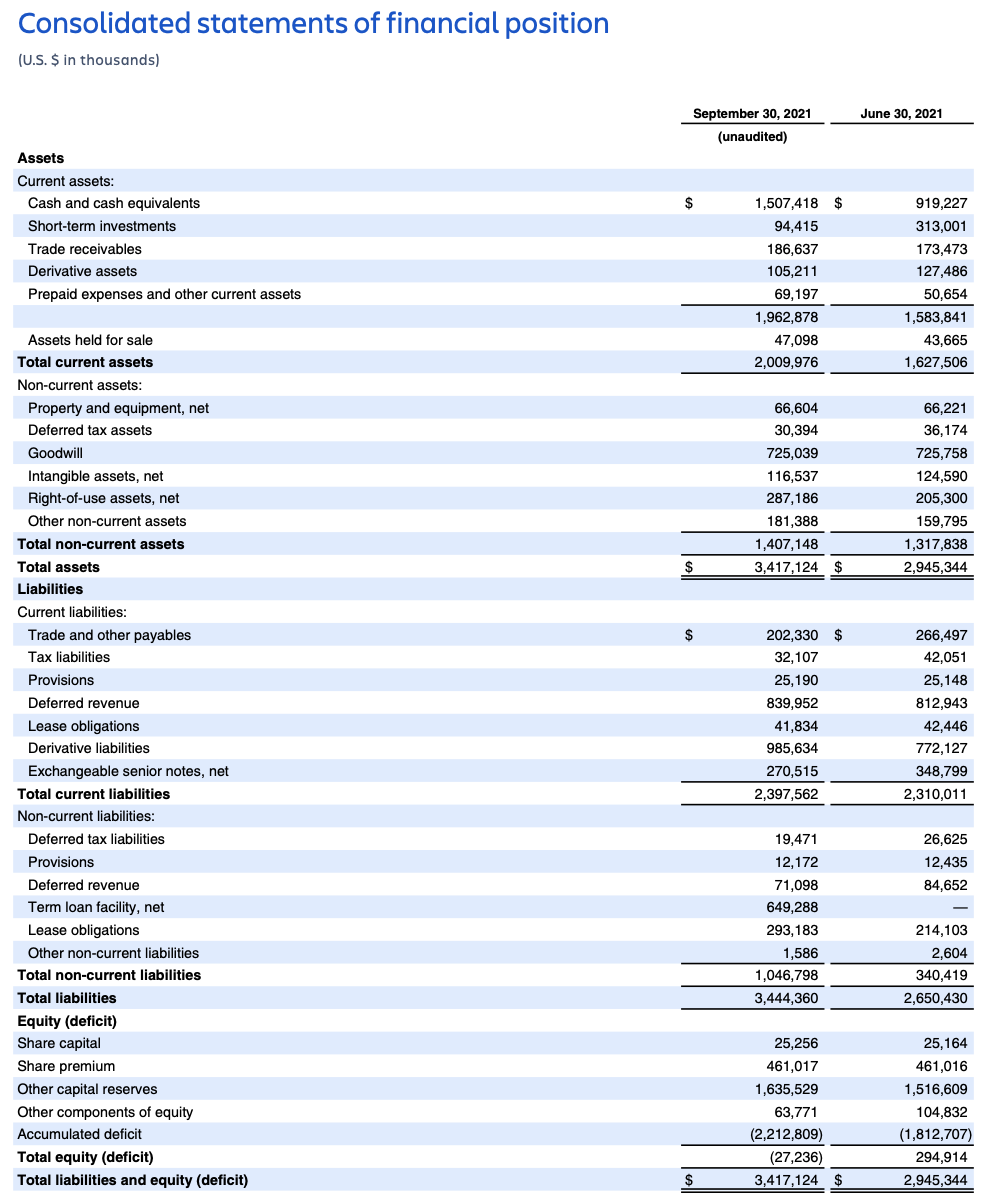
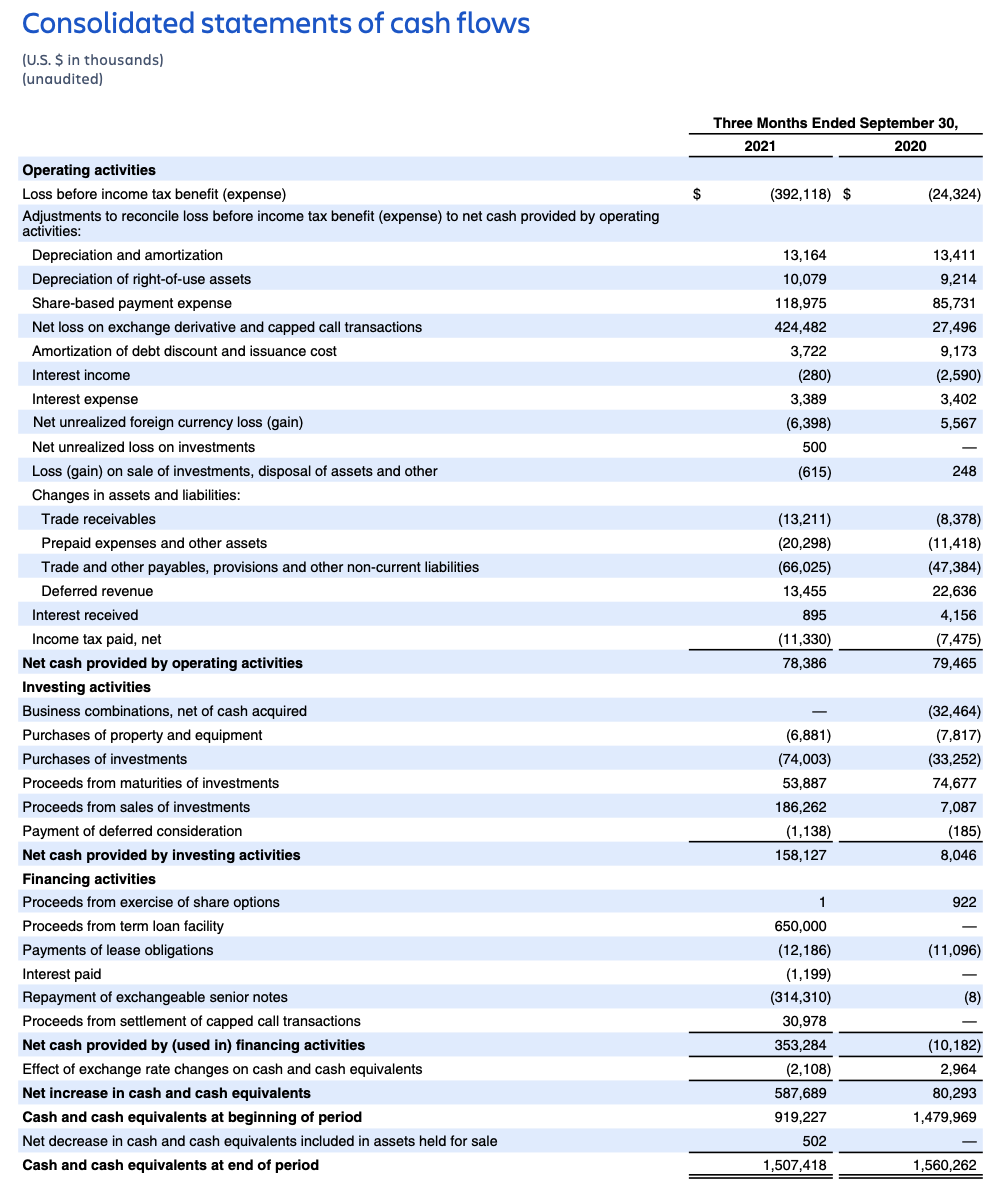
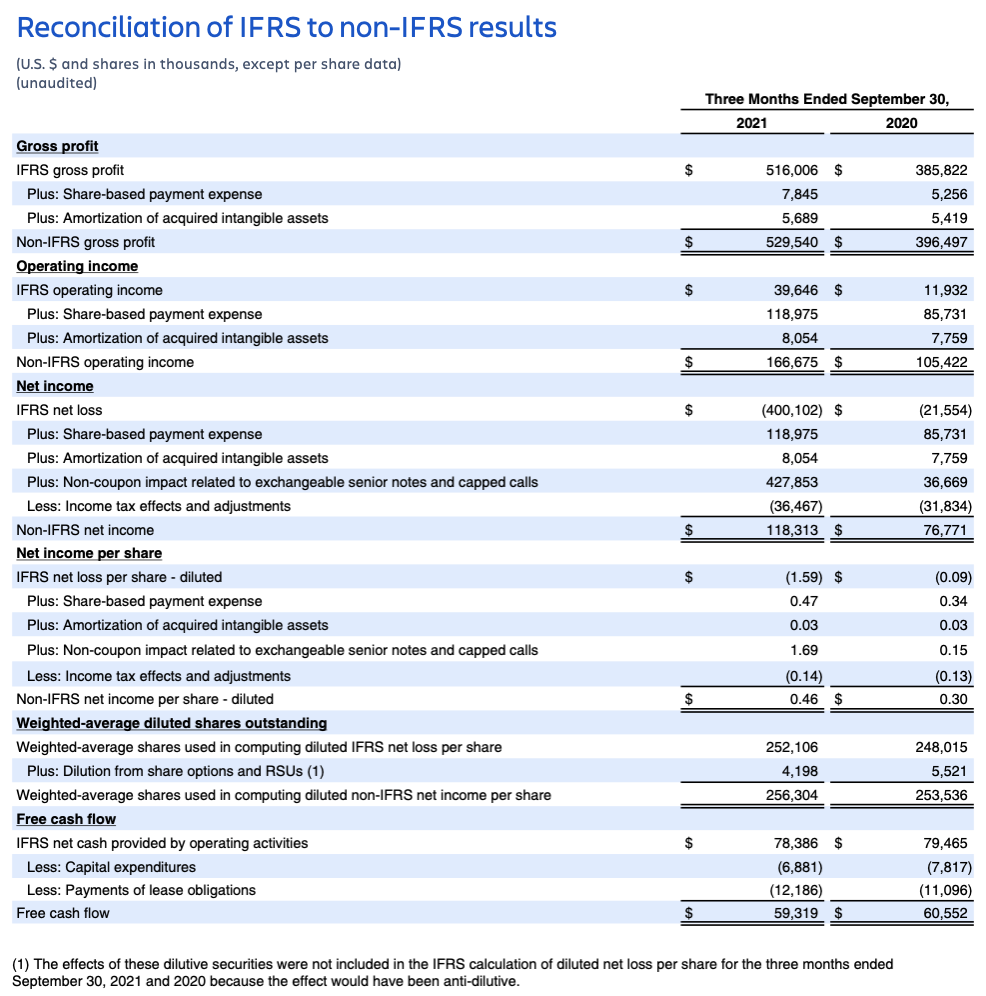
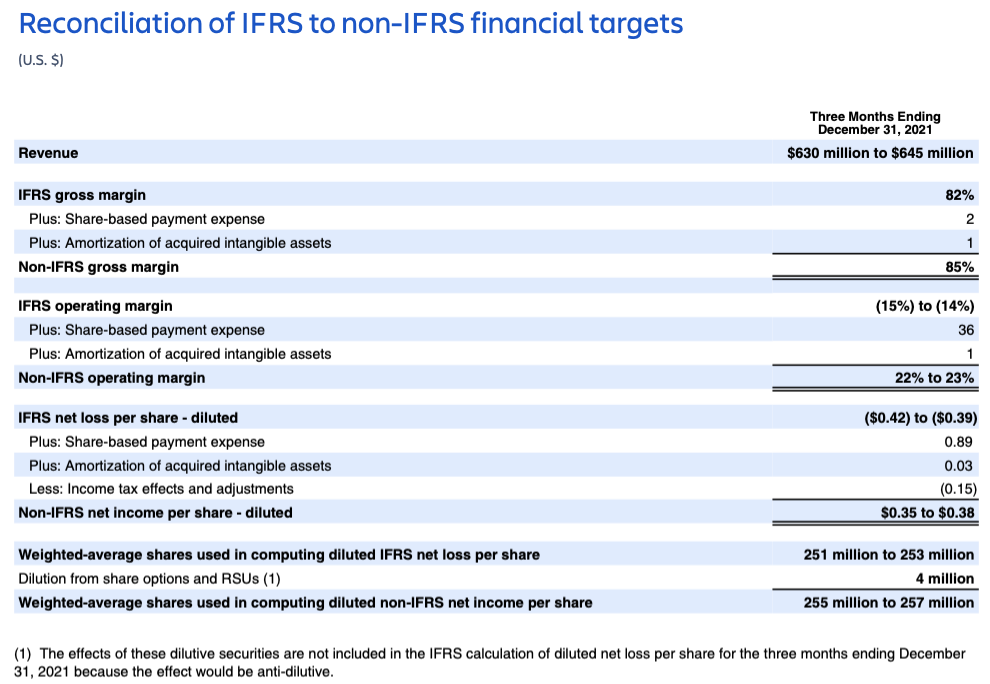
Forward-looking statements
This shareholder letter contains forward-looking statements, within the meaning of the Private Securities Litigation Reform Act of 1995, which statements involve substantial risks and uncertainties. All statements other than statements of historical fact could be deemed forward looking, including risks and uncertainties related to statements about our products, customers, anticipated growth, go-to-market model, strategy and other key strategic areas, Atlassian Marketplace, sustainability, partnerships, outlook, technology and customer migrations, and our financial targets such as revenue, share count, and IFRS and non-IFRS financial measures including gross margin, operating margin, net income (loss) per diluted share and free cash flow.
We undertake no obligation to update any forward-looking statements made in this shareholder letter to reflect events or circumstances after the date of this shareholder letter or to reflect new information or the occurrence of unanticipated events, except as required by law.
The achievement or success of the matters covered by such forward-looking statements involves known and unknown risks, uncertainties and assumptions. If any such risks or uncertainties materialize or if any of the assumptions prove incorrect, our results could differ materially from the results expressed or implied by the forward-looking statements we make. You should not rely upon forward-looking statements as predictions of future events. Forward-looking statements represent our management’s beliefs and assumptions only as of the date such statements are made.
Further information on these and other factors that could affect our financial results is included in filings we make with the Securities and Exchange Commission from time to time, including the section titled “Risk Factors” in our most recent Forms 20-F and 6-K (reporting our quarterly results). These documents are available on the SEC Filings section of the Investor Relations section of our website at: https://investors.atlassian.com.
About non-IFRS financial measures
Our reported results and financial targets include certain non-IFRS financial measures, including non-IFRS gross profit, non-IFRS operating income, non-IFRS net income, non-IFRS net income per diluted share, and free cash flow. Management believes that the use of these non-IFRS financial measures provides consistency and comparability with our past financial performance, facilitates period-to-period comparisons of our results of operations, and also facilitates comparisons with peer companies, many of which use similar non-IFRS or non-GAAP financial measures to supplement their IFRS or GAAP results. Non-IFRS results are presented for supplemental informational purposes only to aid in understanding our results of operations. The non-IFRS results should not be considered a substitute for financial information presented in accordance with IFRS, and may be different from non-IFRS or non-GAAP measures used by other companies.
Our non-IFRS financial measures include:
- Non-IFRS gross profit. Excludes expenses related to share-based compensation and amortization of acquired intangible assets.
- Non-IFRS operating income. Excludes expenses related to share-based compensation and amortization of acquired intangible assets.
- Non-IFRS net income and non-IFRS net income per diluted share. Excludes expenses related to share-based compensation, amortization of acquired intangible assets, non-coupon impact related to exchangeable senior notes and capped calls, the related income tax effects on these items, and a discrete tax impact resulting from a non-recurring transaction.
- Free cash flow. Free cash flow is defined as net cash provided by operating activities less capital expenditures, which consists of purchases of property and equipment and payments of lease obligations.
Our non-IFRS financial measures reflect adjustments based on the items below:
- Share-based compensation.
- Amortization of acquired intangible assets.
- Non-coupon impact related to exchangeable senior notes and capped calls:
- Amortization of notes discount and issuance costs.
- Mark to fair value of the exchangeable senior notes exchange feature.
- Mark to fair value of the related capped call transactions.
- Net loss on settlements of exchangeable senior notes and capped call transactions.
- The related income tax effects on these items, and a discrete tax impact resulting from a non-recurring transaction.
- Purchases of property and equipment and payments of lease obligations.
We exclude expenses related to share-based compensation, amortization of acquired intangible assets, non-coupon impact related to exchangeable senior notes and capped calls, the related income tax effects on these items, and a discrete tax impact resulting from a non-recurring transaction from certain of our non-IFRS financial measures as we believe this helps investors understand our operational performance. In addition, share-based compensation expense can be difficult to predict and varies from period to period and company to company due to differing valuation methodologies, subjective assumptions, and the variety of equity instruments, as well as changes in stock price. Management believes that providing non-IFRS financial measures that exclude share-based compensation expense, amortization of acquired intangible assets, non-coupon impact related to exchangeable senior notes and capped calls, the related income tax effects on these items, and a discrete tax impact resulting from a non-recurring transaction allow for more meaningful comparisons between our results of operations from period to period.
Management considers free cash flow to be a liquidity measure that provides useful information to management and investors about the amount of cash generated by our business that can be used for strategic opportunities, including investing in our business, making strategic acquisitions, and strengthening our statement of financial position.
Management uses non-IFRS gross profit, non-IFRS operating income, non-IFRS net income, non-IFRS net income per diluted share, and free cash flow:
- As measures of operating performance, because these financial measures do not include the impact of items not directly resulting from our core operations.
- For planning purposes, including the preparation of our annual operating budget.
- To allocate resources to enhance the financial performance of our business.
- To evaluate the effectiveness of our business strategies.
- In communications with our Board of Directors and investors concerning our financial performance.
The tables in this shareholder letter titled “Reconciliation of IFRS to non-IFRS Results” and “Reconciliation of IFRS to non-IFRS financial targets” provide reconciliations of non-IFRS financial measures to the most recent directly comparable financial measures calculated and presented in accordance with IFRS.
We understand that although non-IFRS gross profit, non-IFRS operating income, non-IFRS net income, non-IFRS net income per diluted share, and free cash flow are frequently used by investors and securities analysts in their evaluation of companies, these measures have limitations as analytical tools, and you should not consider them in isolation or as substitutes for analysis of our results of operations as reported under IFRS.
About Atlassian
Atlassian unleashes the potential of every team. Our team collaboration and productivity software helps teams organize, discuss and complete shared work. Teams at more than 200,000 customers, across large and small organizations – including Redfin, NASA, Verizon, and Dropbox – use Atlassian’s project tracking, content creation and sharing, and service management products to work better together and deliver quality results on time. Learn more about our products including Jira Software, Confluence, Jira Service Management, Trello, Bitbucket, and Jira Align at https://atlassian.com.
Investor relations contact: Martin Lam, IR@atlassian.com
Media contact: Kelsey Castellow, press@atlassian.com
—–
1 Gartner and Magic Quadrant are registered trademarks of Gartner Inc or its affiliates, used herein with permission. All rights reserved. The Gartner content described herein (the “Gartner Content”) represent(s) research opinion or viewpoints published, as part of a syndicated subscription service, by Gartner, Inc. (“Gartner”), and are not representations of fact. Gartner Content speaks as of its original publication date (and not as of the date of this shareholder’s letter), and the opinions expressed in the Gartner Content are subject to change without notice.
Gartner does not endorse any vendor, product or service depicted in its research publications and does not advise technology users to select only those vendors with the highest ratings or other designation. Gartner research publications consist of the opinions of Gartner’s research organization and should not be construed as statements of fact. Gartner disclaims all warranties, expressed or implied, with respect to this research, including any warranties of merchantability or fitness for a particular purpose.
Gartner Peer Insights content consists of the opinions of individual end users based on their own experiences with the vendors listed on the platform, should not be construed as statements of fact, nor do they represent the views of Gartner or its affiliates. Gartner does not endorse any vendor, product or service depicted in this content nor makes any warranties, expressed or implied, with respect to this content, about its accuracy or completeness, including any warranties of merchantability or fitness for a particular purpose.


